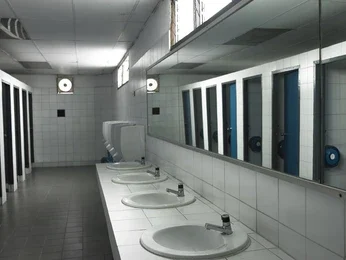A Full Review of “Dune 1984”
October 27, 2021
With Dune getting a shiny new two-part remake, with part 1 coming out this October, I thought it might be a nice idea to revisit the original Dune movie.
Dune (1984) is a polarizing movie. When I told my father that I was reviewing it, he laughed and told me that it was “not a good movie.” Still, I looked forward to watching director David Lynch’s adaptation of the classic sci-fi novel. Despite my father’s review, Amazon users still gave it a rating of four and a half stars. Perhaps the Internet would prove my father wrong.
Dune begins with a minute-long expositional speech, followed by a long credit sequence and another minute of pure exposition. This definitely sets the tone for the rest of the film. Heavy exposition, followed by difficult-to-follow action full of a technical jargon so complex and ill-explained that some theaters handed out glossaries when the movie originally screened.
The first act of the film is, at once, the best and the most boring. It is paced well with tension built up from the excellent performances of Jürgen Prochnow as the Duke Atreides and Sir Patrick Stewart as Gurney Halleck, the leader of the Atreides army. However, the beginning expositional segments tell the audience what is going to happen to the Atreides on Dune, taking the air out of the drama as viewers know theoutcome. The identity of the traitor in the Atreides ranks is not even kept secret for suspense, as Lynch seems to take pains to explain everything happening on screen in the voiceovers of many different characters.
Although some elements— like the laughable special effects and incomprehensible jargon—marred the early scenes, I still thought that in the opening Lynch had done an admirable job of bringing Dune to the silver screen. However, after Paul and Jessica are cast off into the desert, the movie essentially falls apart in a puddle of tenuously connected scenes and horrible action. Much of this part of the film also takes place in montage fashion, which only accentuates an unnecessary rush to the finish line. (The film spends so long explaining the premise that it almost has no choice but to speed through these scenes (which may be one of the reasons the new film has been set up into two parts) . Plot and character development simply happen, with few causes to back them up. The plot becomes convoluted and religious overtones emerge, but as the great film critic Roger Ebert put it, these are “best left unexplored.” The ending is another confusing action scene, where many guns are fired and many explosions set off, with little emotional impact. Giant sandworms emerge, and are pathetic, although there are flashes of brilliance and a memorable but brief shot of Paul’s young sister standing over the battlefield with a knife.
Still, a good Dune film is possible. The new film that releases in theaters on October 22nd looks promising to me, as the director Denis Villeneuve has already shown his ability to create great sci-fi with Blade Runner, 2049. Dune is, however, an extremely dense book with environmental, religious, moral, and political plots. To contain all of these even within the generous runtime of two hours and 35 minutes is essentially impossible, and I expect much to be cut from Dune(2021). As a fan of the book, I hope to see the new movie succeed where the 1984 version failed. At the very least I look forward to the diehard fans of 1984 reacting to what surely is a better attempt. Surely.



















Andrew Moore • Dec 20, 2021 at 1:55 am
Dune 1984 is a classic, 2021 is boring with no character development. Give me 1984 any day of the week. Way better music score too.